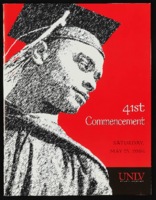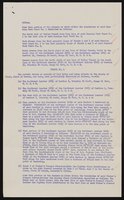Search the Special Collections and Archives Portal
Search Results

Fernando Rocha oral history interview: transcript
Date
Archival Collection
Description
Oral history interview with Fernando Rocha conducted by Nathalie Martinez and Barbara Tabach on November 13, 2019 for the Latinx Voices of Southern Nevada Oral History Project. In this interview, Fernando Rocha recalls growing up in Santa Ana, California and in Sunrise Manor in Las Vegas, Nevada. Fernando Rocha is a Mexican professional who is committed to giving back to the Latinx youth of Las Vegas. He talks about his responsibility as a translator in his family with his siblings. He credits his academic and professional success to the Clark County School District and programs such as GEAR UP and Upward Bound. After studying at Hofstra University, he came back to Las Vegas to work with Wells Fargo and is an active community member as co-founder of the Nevada Youth Coalition and work through the Association of Latino Professionals for America (ALPFA) and Nevada Promise Mentor at the College of Southern Nevada (CSN).
Text

University of Nevada, Las Vegas (UNLV) 41st commencement program
Date
Archival Collection
Description
Commencement program from University of Nevada, Las Vegas Commencement Programs and Graduation Lists (UA-00115).
Text
Mollie Gregory Collection of Oral Histories
Identifier
Abstract
The Mollie Gregory Collection of Oral Histories contains audio interviews and brief transcripts that focus on welfare, family, and women's issues in Nevada from 1970 to 1974. Gregory interviewed Nevada residents including Maya Miller, Ruby Duncan, and Mary Wesley, who described their lives during the anti-poverty and women's rights campaigns in the early 1970s. The collection documents views on welfare; the Equal Rights Amendment; race, discrimination, and civil rights; and political campaigns.
Archival Collection
Jacob E. Von Tobel Photograph Collection
Identifier
Abstract
The Jacob E. Von Tobel Photograph Collection contains black-and-white photographs of the pioneer Von Tobel family from 1900 to 1980. The collection includes photographs of the Von Tobel family, early Las Vegas, Nevada buildings and landmarks, and aerial photographs of Las Vegas and surrounding areas.
Archival Collection
University of Nevada, Las Vegas Photograph Collection
Identifier
Abstract
The University of Nevada, Las Vegas Photograph Collection (approximately 1900-2004) depicts the development of the university and the city of Las Vegas. The collection includes images of campus buildings, student activities, sports teams, past university presidents, and Las Vegas in the early twentieth century. Early images depicting the surrounding area are included in this collection as well.
Archival Collection
Tom Hawley Papers
Identifier
Abstract
The Tom Hawley Papers (approximately 1955-2019) contain the personal papers of Las Vegas, Nevada based traffic and transportation reporter, Tom Hawley. The collection primarily includes physical and digital materials that represent Hawley's interests in Las Vegas history; transportation issues in the Las Vegas Valley, including the Las Vegas Monorail and Resort Corridor Project; and his work as a traffic and transportation reporter for KSNV Channel 3. Materials from KSNV include video clips and transcripts of
Archival Collection
Penelope Ruchman Collection of Las Vegas, Nevada Casino Professionals Oral Histories
Identifier
Abstract
The Penelope Ruchman Collection of Las Vegas, Nevada Casino Professionals Oral Histories includes interviews conducted by Ruchman from approximately 1999 to 2001 of casino industry workers who worked in Las Vegas, Nevada. The majority of interviews were conducted by Ruchman in their office at Gambler's Book Shop (GBS), but some where conducted in interviewee's homes and offices, or over the phone. The collection represents Ruchman's efforts to interview and document a generation of early casino industry workers that were quickly aging. The project was intended to be compiled as a definitive history of Las Vegas and American gambling, entitled "After the Gold Rush." The project was permanently postponed in the fall of 2001 when Ruchman left GBS to work for Park Place Entertainment as a corporate business and operations analyst, and later as casino operations director for Caesars Palace. Not all interviews have digital transcripts available.
Archival Collection
Alice P. Broudy Papers on Broudy v. United States
Identifier
Abstract
The Alice P. Broudy Papers on Broudy v United States (1940-2018) comprise materials collected and created by the wife of Charles A. Broudy during her effort to obtain compensation for his death in 1977, which she believed to be a result of repeated radiation exposure. Materials include government documents obtained through the Freedom of Information Act (FOIA), correspondence, memos, litigation papers, scholarly reports and articles on radiation exposure and its effects, congressional testimony, speeches, newspaper clippings, books and audiovisual materials. Also included are photographs, slides, and one box of Alice "Pat" Broudy's personal papers. There are two boxes of papers that remain unprocessed.
Archival Collection


